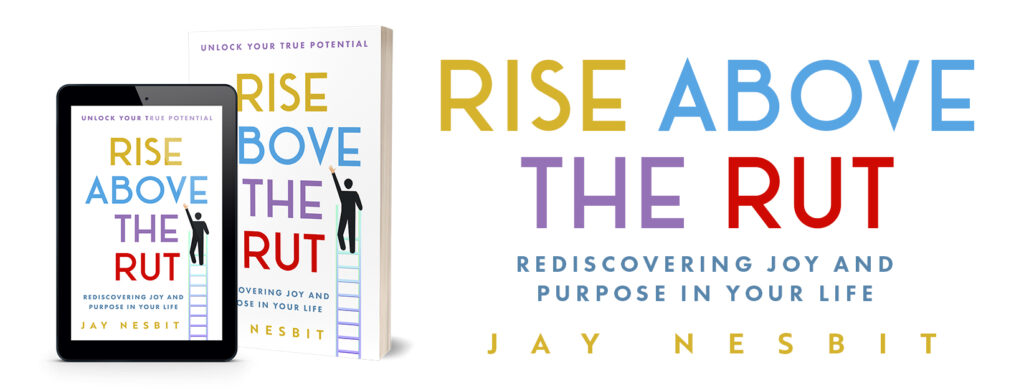Jay Nesbit, Author of “Rise Above the Rut” – January 5, 2024

Introduction:
Meet procrastination, that sneaky saboteur disrupting our productivity. Ever found yourself in a Netflix marathon instead of tackling important tasks? You’re not alone—80% of individuals grapple with this challenge. The Ripple Effect of procrastination extends beyond missed deadlines and unmet goals; it’s a chain reaction impacting personal and professional growth. When we delay essential activities, the repercussions spiral into guilt, affecting our overall well-being.
Time to Break Free:
The good news? Conquering Procrastination opens doors that lead to reaching your goals. Stick around; we’re revealing how to liberate yourself from procrastination’s grip and, subsequently, unlock a path to achievement and fulfillment.
The Psychology Behind Procrastination:
Now, let’s investigate the psychological intricacies behind procrastination. Picture your brain orchestrating a procrastination symphony, playing tricks with the “time inconsistency” model. This model tricks you into favoring instant rewards (like a Netflix binge) over long-term gains (such as completing an important project).
Understanding the Psychology:
The “time inconsistency” model is like a cunning conductor in our brains. It influences our decisions by convincing us that immediate rewards are more appealing than delayed, but more substantial, gains. In short, it’s the reason we choose short-term pleasures over long-term achievements. It is a similar idea to thinking fast or thinking slow.
Click here to read my blog on “Change Your Attitude, Change your life”
Understanding and Addressing Your Procrastination Triggers:
Now, let’s look deeper into the reasons behind your procrastination and the appeal of short-term rewards. What triggers your delay in action—fear of failure, the pursuit of perfection, or a lack of motivation? Self-reflection is key to recognizing and addressing your unique procrastination triggers.
To tackle your triggers, consider the following steps:
- Awareness: Acknowledge when procrastination starts. Is it when faced with a challenging task, the pressure of deadlines, or the need for perfection?
- Record Patterns: Keep a journal noting instances of procrastination. Look for recurring themes or situations that consistently lead to delays.
- Break It Down: If a task feels overwhelming, break it into smaller, more manageable steps. This can make it less intimidating and reduce the likelihood of procrastination.
- Set Realistic Goals: Establish achievable goals and deadlines. Unrealistic expectations can fuel procrastination.
- Seek Support: Share your goals with friends or colleagues who can provide encouragement and hold you accountable.
By understanding your triggers and taking proactive steps, you can navigate your way through procrastination and work towards a more productive and fulfilling life. And who wouldn’t want that outcome?

Consequences of Procrastination: The Domino Effect:
Procrastination isn’t merely about missed deadlines—it’s a pervasive force that infiltrates every facet of our lives, creating a domino effect with far-reaching consequences. To understand the gravity, let’s explore relatable stories that illuminate the full cost of prolonged procrastination.
Story 1: Mental Health Impact Meet Sarah, a talented graphic designer with dreams of starting her own business. However, her habit of procrastinating on crucial business planning tasks led to a constant state of stress. As deadlines loomed, her anxiety intensified, impacting her mental well-being. The prolonged cycle of procrastination took a toll on Sarah’s self-esteem and overall happiness.
Story 2: Strained Relationships John, an ambitious professional, constantly postponed spending quality time with his family due to work-related procrastination. The delayed family vacations and missed events strained his relationships. The emotional distance that developed over time became a stark reminder of the interpersonal toll procrastination can take.
Story 3: Deteriorating Well-being Consider Emily, who procrastinated on adopting a healthier lifestyle. Postponing exercise routines and opting for quick, unhealthy meals took a toll on her physical well-being. Over time, the consequences manifested in weight gain, low energy levels, and a diminished overall sense of wellness.
These relatable stories highlight the profound impact of procrastination, extending beyond the realm of missed tasks to influence mental health, relationships, and overall well-being. Understanding these consequences serves as a powerful motivator to break free from the procrastination cycle and embrace a more fulfilling and balanced life.
Strategies for Overcoming Procrastination: Breaking the Chains:
It’s time for you to kick procrastination to the curb! Armed with insights into its sneaky ways, here’s your battle plan. Each strategy serves as a trusty weapon in your arsenal.
The Pomodoro Technique: Time in Chunks: Ever heard of the Pomodoro Technique? It’s like a productivity power-up. Break your work into focused, 25-minute chunks or Pomodoros, followed by a 5-minute break. After every 4 Pomodoros, take a longer break of 15-30 minutes. This method keeps your brain sharp and procrastination at bay. Sarah, our assignment-battling hero, swears by it.
Time-Blocking: Mastering Your Schedule: Now, let’s talk about time-blocking, a scheduling superhero move. Allocate specific blocks of time to different tasks. This not only adds structure to your day but also keeps procrastination on a tight leash. Imagine having a plan, like John chose, to improve his work-life balance by designating time slots for each.
Setting SMART Goals: Your Roadmap to Success: Now, let’s dive into the powerful strategy of setting SMART goals—specific, measurable, achievable, relevant, and time-bound. Imagine them as your personalized roadmap, steering you clear of procrastination pitfalls and guiding you straight to success.
Here’s a breakdown of how each element of SMART goals can transform your approach:
- Specific: Clearly define what you want to accomplish. Vague goals lead to confusion, but being specific provides you with a clear target. As you navigate through a sea of assignments, finding clarity becomes crucial. Specify exactly what each task entails, breaking down objectives into precise steps.
- Measurable: Make your progress tangible. When you can measure your achievements, it not only boosts your motivation but also keeps procrastination at bay. Picture having clear milestones, tracking the completion of each assignment to make your progress evident and encouraging.
- Achievable: Ensure your goals are realistic. Setting unattainable targets can lead to frustration and procrastination. If you’ve ever felt overwhelmed before, discover the power of breaking tasks into achievable chunks. Make each step manageable, learning from past experiences.
- Relevant: Align your goals with your overall objectives. This ensures that your efforts are meaningful and directly contribute to your success. If you have ever been unsure where to start, learn to choose tasks that are directly relevant to your larger academic goals, following the example of your own journey.
- Time-Bound: Add a deadline to create a sense of urgency. A ticking clock is a powerful antidote to procrastination. Transform your approach by assigning specific timeframes to each assignment. This way, you create a structured timeline, enhancing productivity without the need for external references.
By incorporating SMART goals into your strategy, you’re not just setting intentions; you’re crafting a plan with built-in motivation and clarity. With each SMART goal, you’re one step closer to conquering tasks systematically. Embrace this roadmap, and watch how it transforms your journey toward success.
Building a Proactive Mindset:
Unleash your inner proactive superhero! It’s more than just a buzzword; a proactive mindset is a game-changer in your battle against procrastination. Shifting to this mindset empowers you to take control of your time and tasks, resulting in a more fulfilling and less stressful life.
This shift isn’t just a theory; it’s a tangible change you can make. The proactive mindset becomes your secret weapon for navigating through the challenges of procrastination and achieving your goals with purpose. Embrace it to proactively plan your schedule, ensuring more control, less stress, and a newfound sense of accomplishment. The transformation is within your reach, offering practical insights into overcoming procrastination and fostering a proactive approach to tasks and deadlines.
Cultivating Habits for Long-Term Success: Habit Heroes:
Cultivating Habits for Long-Term Success: Step into your role as a Habit Hero and conquer procrastination through the power of habit stacking. Habit stacking is a practical strategy that involves integrating a new habit into an existing routine. For example, you can attach a new habit, like checking your to-do list, to an established daily ritual, such as your morning coffee routine.
This approach simplifies the process of building positive habits by leveraging activities you already do consistently. By connecting a new behavior to an existing routine, you make productivity a seamless part of your day. Habit stacking doesn’t require monumental efforts; instead, it focuses on small, intentional changes that lead to significant productivity gains. Embrace this strategy to effortlessly incorporate positive habits into your daily life and pave the way for long-term success in overcoming procrastination.
Celebrating Small Wins: Progress, Not Perfection:
By adopting methods like habit stacking, cultivating a proactive mindset, and setting specific, measurable, achievable, relevant, and time-bound (SMART) goals, you pave the way for these victories. Acknowledging and celebrating these small triumphs becomes essential for staying motivated and maintaining momentum on your empowering journey. It’s not just about the destination; it’s about the journey. Progress, not perfection, is the mantra that will carry you through, and we’re here to guide you on this empowering path, drawing from reviewing my previous posts.
Conclusion: Seizing the Day:
As we wrap up, remember the core message. Overcoming procrastination isn’t just about boosting productivity; it’s about unlocking a more fulfilling life. Take that first step and embrace the journey toward achievement and fulfillment!
Call to Action: Your Turn:
Share your experiences with procrastination in the comments. Explore additional resources for a deeper dive into personal development. Subscribe for more insights on productivity and personal growth. Let’s embark on the journey to conquer procrastination together!

